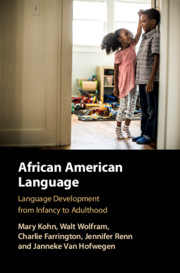Book contents
- African American Language
- African American Language
- Copyright page
- Contents
- Figures
- Tables
- Preface
- Abbreviations
- 1 Coming of Age in African American Language
- 2 The Analysis of Sociolinguistic Change over the Lifespan
- 3 Profiles of Change
- 4 Vowel Variation across Time and Space
- 5 Caretaker’s Influence on Vernacularity
- 6 The Influence of Peers on the Use of African American Language
- 7 Stylistic Variation in the Early AAL Lifespan
- 8 The Relationship of African American Language and Early Literacy Skills
- 9 A Longitudinal Study in Retrospect
- Appendix AAL Feature Code Key
- Index
- References
6 - The Influence of Peers on the Use of African American Language
Published online by Cambridge University Press: 24 November 2020
- African American Language
- African American Language
- Copyright page
- Contents
- Figures
- Tables
- Preface
- Abbreviations
- 1 Coming of Age in African American Language
- 2 The Analysis of Sociolinguistic Change over the Lifespan
- 3 Profiles of Change
- 4 Vowel Variation across Time and Space
- 5 Caretaker’s Influence on Vernacularity
- 6 The Influence of Peers on the Use of African American Language
- 7 Stylistic Variation in the Early AAL Lifespan
- 8 The Relationship of African American Language and Early Literacy Skills
- 9 A Longitudinal Study in Retrospect
- Appendix AAL Feature Code Key
- Index
- References
Summary
Adolescents use the language of peers as models for dialect acquisition in ways that sometimes diverge from their family or home variety, often leading to broad heterogeneity and unpredictability during adolescence and early adulthood. Participants in Grade 6, 8, and 10 were paired with a same-sex peer partner and interviewed in dyads. In this chapter, using an analytical model based on Communication Accommodation Theory (CAT), we establish participants’ convergence to or divergence from the peer partner. The study analyzes these accommodation patterns in adolescent African American dyads through the use of the scores from the Dialect Density Measure (DDM) composite index and an analysis for assessing relative similarity within dyads for large dyadic samples. The results reveal that samples exhibiting high and significant intra-class correlations (ICC) indicate more accommodation in terms of the DDM than those with low, non-significant ICCs. The study uncovers important gender differences in accommodative patterns intersecting with grade level as well as a role for ethnic identity. Ethnically salient features are employed as resources for accommodation for both girls and boys, but in different ways.
Keywords
- Type
- Chapter
- Information
- African American LanguageLanguage development from Infancy to Adulthood, pp. 135 - 166Publisher: Cambridge University PressPrint publication year: 2020

